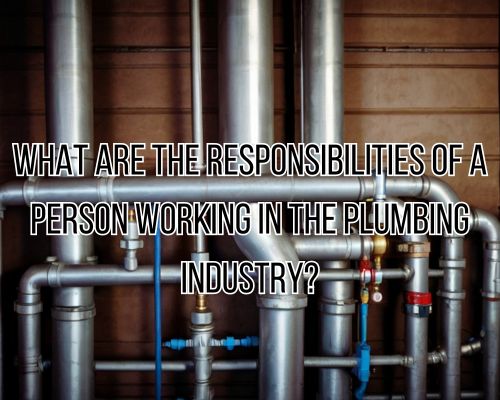“If you are considering a career in the plumbing industry, you should understand the responsibilities that come with the job.” said Dean Owens of Roof Plumber Warragul.

Plumbers are responsible for installing, repairing, and maintaining various plumbing systems in commercial and residential buildings. This includes gas and water pipes, sanitation units, sinks, toilets, and other fixtures.
One of the primary responsibilities of a plumber is to ensure that plumbing systems comply with local rules and regulations. This involves assessing and designing plumbing systems, as well as making sure that they are installed correctly. Plumbers may also be responsible for setting up systems for the supply of oxygen and other medical gases in hospitals and health facilities.
In addition to installation and maintenance, plumbers are also responsible for repairing damaged dishwashers, broken pipes, and clogged drains.
They collaborate with other construction professionals such as general contractors to ensure everything goes according to plan during renovations or new builds. As a plumber, you must also have the necessary skills to troubleshoot and solve any problems that may arise with plumbing systems.
Core Responsibilities and Skills
As a person working in the plumbing industry, you will have several core responsibilities and skills that are essential to your job.
Installation and Maintenance
One of your primary responsibilities as a plumber will be to install and maintain water supply and drainage systems, as well as plumbing fixtures.
This will require technical skills and knowledge of plumbing tasks, such as working with pipes, fittings, and sinks. You will also need to have attention to detail to ensure that all installations are done correctly and to code.
Repair and Troubleshooting
Another important aspect of your job will be to repair and troubleshoot plumbing problems.
This will require problem-solving skills and the ability to diagnose issues with fixtures, leaks, and clogs. You will also need to have technical skills to repair and replace plumbing components as needed.
Safety and Compliance
Safety is a critical concern in the plumbing industry, and you will need to be knowledgeable about safety regulations and plumbing code standards.
This includes following safety standards for yourself and others, as well as ensuring that all installations and repairs are up to code.
To perform your job effectively like what Roof Plumber Warragul does, you will also need to have good communication skills to work with clients and other professionals. Additionally, you will need to be familiar with plumbing tools and equipment to complete your tasks efficiently.
Professional Development and Opportunities
As a person working in the plumbing industry, you have a range of professional development opportunities available to you.
These opportunities can help you advance your career, increase your earning potential, and improve your job satisfaction.
Education and Certification
To become a plumber, you typically need a high school diploma or GED certificate, followed by an apprenticeship or trade school program.
During your apprenticeship, you will learn the skills and knowledge needed to become a journeyman plumber. You can also pursue additional education and certification to further your career.
Certifications such as the Certificate III in Plumbing or a Plumbing Contractor’s License can help you demonstrate your qualifications and expertise to employers and customers. Additionally, continuing education courses can help you stay up-to-date with the latest plumbing technologies and techniques.
Career Progression
As you gain experience and qualifications, you can progress through the ranks of the plumbing industry.
You may start as an apprentice, move on to become a journeyman plumber, and eventually become a master plumber or plumbing contractor.
Employers may offer opportunities for advancement such as supervisory roles or project management positions. Alternatively, you may choose to start your own plumbing business.
Employment Conditions
Employment conditions for plumbing apprentices are the same as for other employees working in the plumbing industry. This is through an Award or Employment Agreement. You may be paid under a State or Federal Award, Australian Workplace Agreement (AWA) or an Enterprise Bargaining Agreement (EBA).
As a plumber, you will need to have good physical stamina and strength. You also need good communication and customer service skills. You will also need to be able to work well in a team and independently.
The plumbing industry offers opportunities for professional development and career progression. By pursuing education and certification, gaining experience, and demonstrating your skills and expertise, you can advance your career and achieve your goals.